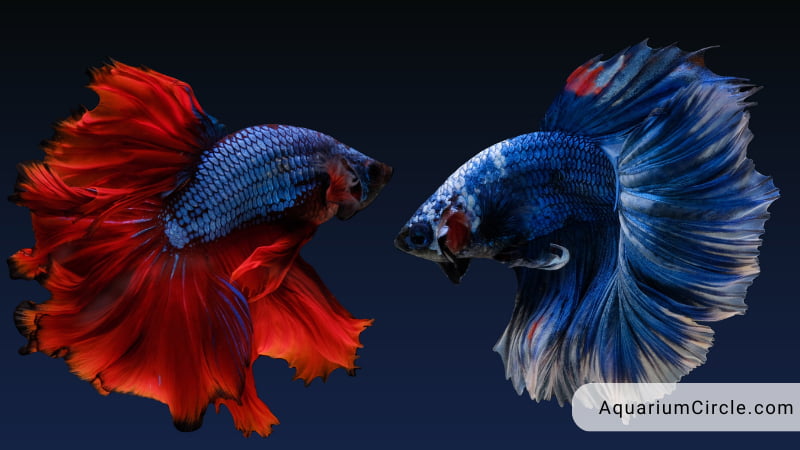Betta fish, also known as Siamese fighting fish, captivate aquarists and casual observers alike with their vibrant colors, flowing fins, and unique personalities. However, these visually striking creatures are not just famous for their beauty – they’re also notorious for their aggression. But why do betta fish fight? What is the reason behind the feisty behavior of these beautiful swimmers?
In this article, we will delve into the factors that contribute to the aggressive tendencies of betta fish, from their genetic makeup and hormonal influences to environmental triggers and historical context. As we explore the fascinating world of betta fish, we will gain a better understanding of their behavior and learn how to appreciate and care for these amazing creatures in a responsible and compassionate way.
See also:
- Can Male And Female Betta Fish Live Together? How Can You Put A Male And Female Betta Fish Together Peacefully?
- Can Female Betta Fish Live Together? Can We Put Two Female Bettas In A Tank?
- Top 3 Most Crucial Things To Know Before Getting A Multiple Betta Fish Tank
Why Do Betta Fish Fight? 8 Common Reasons Behind
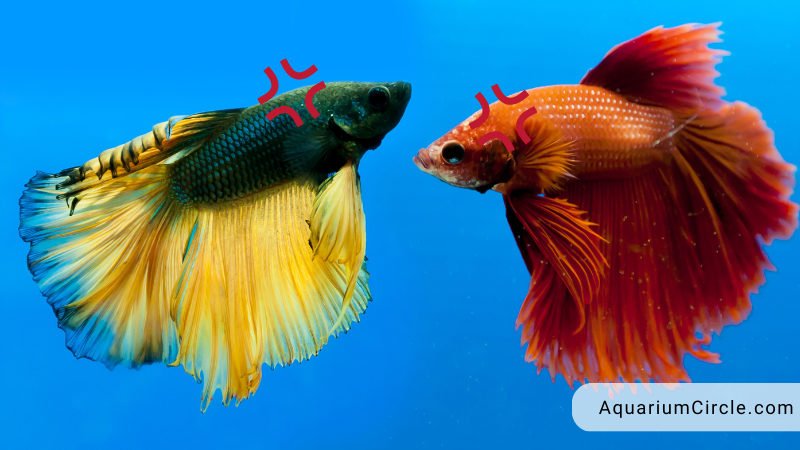
Betta fish engage in combat due to their innate aggressive tendencies, which make them easily provoked. Additionally, they often face numerous external factors within their aquarium environment.
In this list, we will discuss the primary reasons behind the persistent aggression of your betta fish and their inclination to fight with other fish.
They are Predatory fish
Betta fish occupy a high position in the food chain within their natural habitat. As a result, they are unaccustomed to demonstrating submission and tend to become aggressive towards other creatures that appear to challenge their status.
Their instincts drive them to engage in fights and pursue prey as they please, since they rarely encounter opposition under natural conditions.
In the wild, bettas are known for their heightened aggression, particularly towards other bettas.
However, this dynamic changes in an aquarium setting. Although the aquarium is not their natural environment, bettas remain unaware of this fact and continue to rely on their instincts, which stay active even when there is minimal reason for aggression. This fundamental factor primarily contributes to the frequent fights involving betta fish in aquariums.
See also: Betta Fish Natural Habitat: Where Do Betta Fish Come From And How Do They Live In Wild Environment?
Hormones and neurotransmitters
Hormones and neurotransmitters play a crucial role in the regulation of aggression and other behaviors in betta fish, as well as in many other animal species. These chemical messengers are responsible for the communication between various parts of the body, including the brain, and contribute to a wide range of physiological and behavioral processes.
- Testosterone: This hormone is well-known for its association with aggression in both animals and humans. In betta fish, higher levels of testosterone are linked to increased aggression and territorial behavior. Testosterone influences the development of secondary sexual characteristics, such as the vibrant colors and elaborate fins that male bettas display, which can also act as triggers for aggressive encounters.
- Serotonin: Serotonin is a neurotransmitter that plays a vital role in regulating mood, aggression, and social behavior. In betta fish, studies have shown that low levels of serotonin are associated with increased aggression. Manipulating serotonin levels in fish through environmental or pharmaceutical means can alter their aggressive behavior, demonstrating the importance of this neurotransmitter in modulating aggression.
- Cortisol: Cortisol is a stress hormone that helps animals, including fish, respond to stressful situations. Elevated cortisol levels can result from environmental stressors, such as poor water quality, overcrowding, or an inadequate habitat. In betta fish, high cortisol levels can lead to heightened aggression, as the fish attempt to defend their territory or establish dominance in response to stress.
- Vasotocin and isotocin: These are fish-specific hormones that share similarities with mammalian hormones oxytocin and vasopressin. Vasotocin and isotocin have been implicated in various social behaviors in fish, including aggression. Research on the role of these hormones in betta fish aggression is still in its early stages, but they are thought to be involved in modulating aggressive responses to social cues and stimuli.
Understanding the roles of hormones and neurotransmitters in betta fish aggression provides valuable insights into the underlying biological mechanisms that drive their behavior. This knowledge can help aquarists create suitable environments, minimize stress, and promote the well-being of their betta fish.
Overcrowded tank
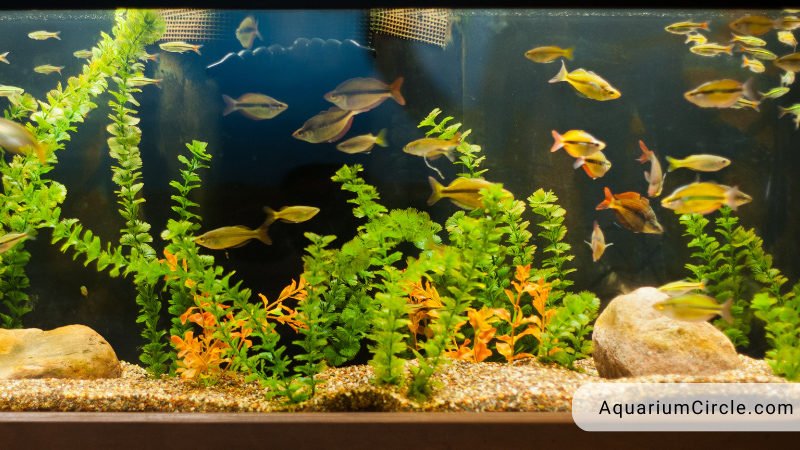
Bettas may also exhibit aggression due to overcrowded living conditions.
As previously discussed, betta fish are inherently aggressive and fiercely territorial creatures. These fundamental traits are significantly challenged when bettas are placed in a densely populated tank. Bettas require ample space and the ability to assert dominance.
When confined to an overcrowded tank, bettas constantly feel threatened and compelled to establish a pecking order and claim territory by attacking other fish species.
See also: How Many Betta Fish In A 10 Gallon Tank: Useful Guide
Unsufficient swimming space
In their natural habitat, bettas inhabit slow-moving streams and shallow bodies of water. While they do not prefer deep waters, they are accustomed to having a vast area to swim, explore, and expend their energy.
An aquarium, in comparison to a betta’s natural environment, is significantly smaller, and this issue is exacerbated when bettas are placed in enclosures with less than the minimum recommended volume of 5 gallons.
Their innate desire to explore their surroundings can make them restless if they are not provided with sufficient space. This stress often manifests as aggression, which they then direct towards other fish or creatures in their vicinity.
Betta fish need ample swimming space to maintain good health. When deprived of sufficient room to swim, they may become frustrated and aggressive. In the wild, bettas often cover long distances while searching for food or mates.
Protecting their nests
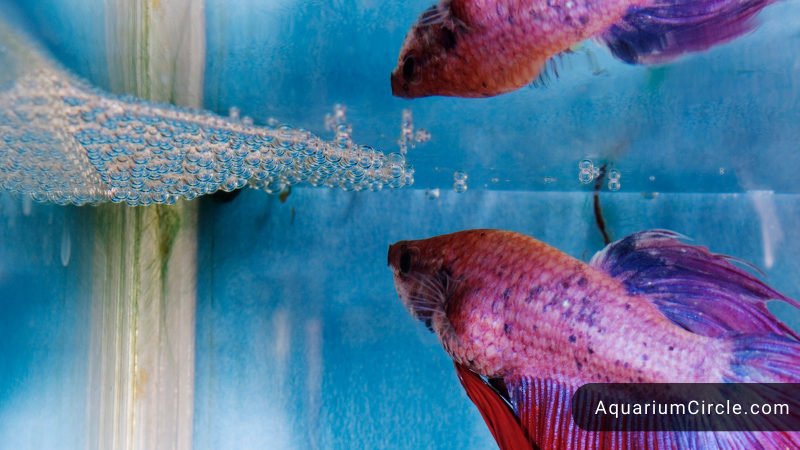
Bettas create bubble nests as a safe place for their eggs until they hatch. However, for many fish, betta eggs are considered a delectable meal, necessitating bettas to defend their nests. In their natural habitat, it is not unusual for male bettas to engage in fierce battles, sometimes to the death, in order to safeguard their eggs from potential predators.
Illness or injury
Illness or injury might not be a direct cause of betta fish fighting, but they still can become territorial and will fight in certain situations. When a betta fish is sick or injured, it may become more vulnerable and stressed, leading to heightened aggression as a defensive mechanism.
An ill or injured betta fish might display heightened territorial behavior to protect itself from potential threats or predators. In an aquarium setting, this can result in increased aggression towards other fish, even if they don’t pose an actual threat. Additionally, stress caused by illness or injury can weaken the immune system of a betta fish, making it more susceptible to diseases and further escalating its aggressive behavior.
See also: Swim Bladder Disease Betta – Betta Care To Be Aware Of
Genetics
Genetics play a significant role in the aggressive behavior of betta fish. Over the centuries, betta fish have been selectively bred for their fighting abilities, particularly in Southeast Asia, where betta fish fighting has been a traditional practice. This selective breeding has led to the development of betta fish strains with heightened aggression and territorial instincts.
The genetic predisposition to aggression is more pronounced in male betta fish, who are notorious for their territorial behavior and fighting with other males. These aggressive tendencies have been passed down through generations due to selective breeding, making it an inherent trait in many betta fish today.
Hunger
Hunger can contribute to increased aggression in betta fish, but it is not a primary reason for betta fish behavior. Betta fish are carnivorous by nature and have a natural hunting instinct. When they are hungry, their instinct to search for food may become more prominent, leading to increased activity and potentially heightened aggression.
In an aquarium setting, if a betta fish is not provided with enough food or the appropriate diet, it may become more aggressive in an attempt to establish dominance over resources or out of frustration from hunger. Additionally, if there are other fish in the betta tank, a hungry betta might display aggressive behavior towards them, especially if they perceive the other fish as competition for limited food resources.
How Can You Tell If Your Betta Fish Is Aggressive?
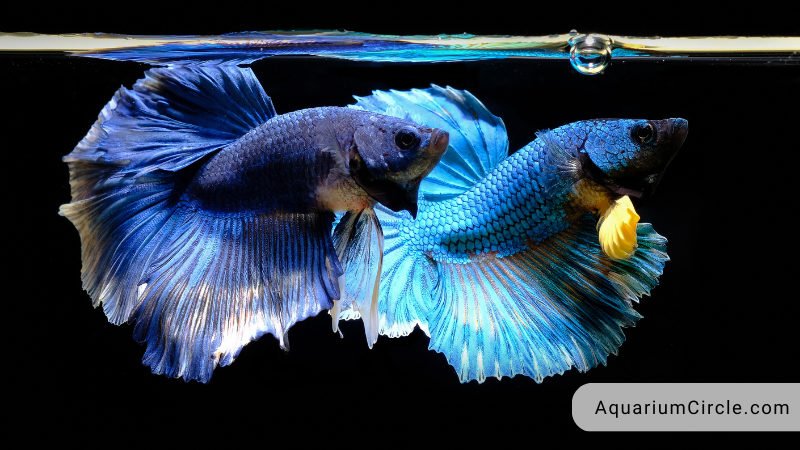
Observing your betta fish’s behavior can help you determine if it is displaying signs of aggression. Some common indicators of aggression in betta fish include:
- Flaring: An aggressive betta fish may flare its gills, making them appear larger and more intimidating. This behavior is often accompanied by the spreading of fins and displaying of bright colors as a warning to potential rivals or threats.
- Chasing: If your betta fish is consistently chasing other fish around the betta fish tank, it may be exhibiting aggressive behavior. This chasing can be a way for the betta to establish dominance or defend its territory.
- Nipping and biting: Aggressive bettas may nip or bite at other fish or even their own reflection. This behavior can lead to fin damage or injury to other tank inhabitants.
- Posturing: An aggressive betta might display posturing behaviors such as swimming in an exaggerated manner, arching its body, or swimming with its fins fully extended to appear larger and more threatening.
- Territorial defense: If your betta fish is consistently guarding a specific area of the tank and attacking any fish that comes near, it may be displaying territorial aggression.
- Stress stripes: Horizontal stripes on a betta fish’s body can be an indicator of stress, which may result from aggressive behavior or living in a stressful environment.
Do Male And Female Betta Fish Fight Each Other?
Yes, both male and female betta fish can exhibit aggressive behavior and likely to fight each other. While male bettas are generally more aggressive and territorial, females can also show aggression under certain circumstances.
Female bettas may establish a hierarchy, known as a “sorority,” when housed together. Aggression may be displayed while they establish dominance within the group. Although female bettas are often considered less aggressive than males, housing multiple females together still requires careful monitoring to ensure their well-being.
When male and female bettas are placed in the same tank, aggression can occur for various reasons, such as competition for resources, territory, or the male attempting to initiate breeding behavior. During the breeding process, males can become particularly aggressive while protecting their bubble nests.
It is generally not recommended to house male and female betta fish together, except for short periods during the breeding process, under careful supervision. To prevent potential aggression and ensure the well-being of your betta fish, it is essential to provide appropriate living conditions, suitable tank mates, and proper care.
Do Male Betta Fish Fight Other Fish?

Male betta fish can indeed fight other fish, not just their own species. Their aggressive tendencies are primarily directed towards other male bettas but can also extend to other fish sharing their tank, particularly those with similar appearances or bright colors that resemble bettas. These traits can trigger a territorial response in male bettas, leading to aggressive behavior and fights.
When selecting tank mates for your male betta, it’s crucial to avoid species with long fins or vibrant colors, as these can provoke aggression. Instead, opt for peaceful, fast-swimming, and non-aggressive species with different appearances. Some suitable tank mates for bettas include:
- Neon tetras
- Harlequin rasboras
- Corydoras catfish
- Pygmy corydoras
- Kuhli loaches
Keep in mind that every betta fish has a unique personality, and individual temperament can vary. It’s essential to closely monitor your betta’s behavior when introducing new tank mates and make adjustments as needed to ensure the well-being of all the fish in your aquarium. Providing ample hiding spots, plants, and a spacious tank can also help reduce territorial aggression and promote a more harmonious environment.
Do They Fight To The Death?
Betta fish can fight to the point of causing severe injury or even death, particularly in the case of males. Male bettas are known for their aggressive behavior and territorial instincts, which can lead to violent confrontations when two males are placed together in the same tank or enclosure. These fights can result in torn fins, damaged scales, or worse, a fatal outcome.
In their natural habitat, betta fish have ample space to swim away and escape a fight, reducing the likelihood of severe injury or death. However, in an aquarium setting, the confined space intensifies the aggression and increases the risk of serious harm.
What Should We Do To Stop Betta Fish From Fighting?
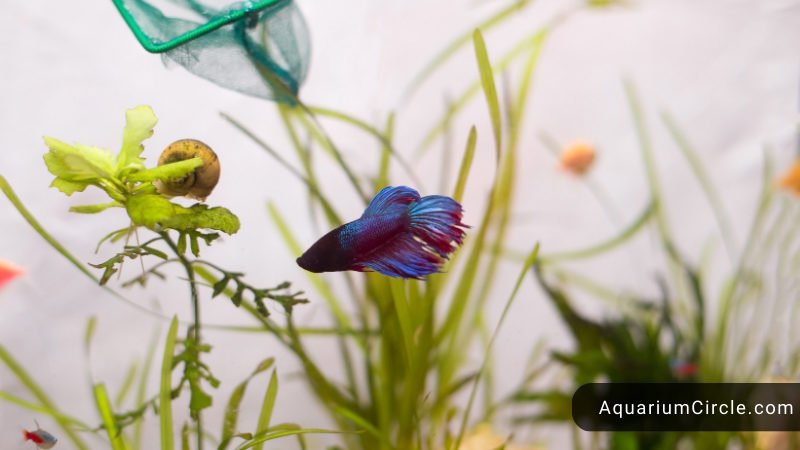
To prevent betta fish from fighting, it’s essential to create a suitable living environment and take necessary precautions. Here are some steps you can take to minimize aggression and ensure the well-being of your betta fish:
- Separate male bettas: Never house one male bettas with another male betta together, as their territorial instincts can lead to violent confrontations. Each male betta should have its own tank.
- Choose appropriate tank mates: If you want to keep your betta with other fish, select peaceful, fast-swimming species that don’t resemble bettas in appearance. Avoid fish with bright colors or long fins, as they may trigger aggression in bettas.
- Provide sufficient space: Ensure your betta fish has an adequately-sized tank, with a minimum of 5 gallons recommended for a single betta. Larger tanks are better if you plan to have additional tank mates.
- Add hiding spots and plants: Include plenty of plants, caves, and decorations in your aquarium to create hiding spots and visual barriers. This setup helps reduce territorial behavior and stress, creating a more peaceful environment.
- Maintain water quality: Regularly monitor and maintain water parameters to keep your betta fish healthy and stress-free. Poor water quality can lead to stress and illness, which can exacerbate aggressive behavior.
- Monitor interactions: Closely observe your betta’s behavior when introducing new tank mates, and be prepared to separate them if aggression becomes an issue. Every betta fish has a unique personality, and some may be more aggressive than others.
- Regular feeding: Feed your betta fish a balanced and appropriate diet to prevent hunger-related stress and aggression.
By providing a suitable living environment, proper care, and carefully selecting tank mates, you can significantly reduce the chances of betta fish fighting and promote a peaceful and harmonious aquarium.
Video About Why Do Betta Fish Fight
FAQs
Why are betta fish so aggressive?
Betta fish are aggressive due to a combination of genetic, hormonal, environmental, and visual factors. They have been selectively bred for their fighting abilities and territorial nature, which contributes to their aggressive behavior.
Can I keep multiple betta fish in the same tank?
It is not recommended to keep multiple male betta fish together in the same tank, as they will likely fight. However, female betta fish can be kept together in a sorority tank with the right setup, careful observation, and a backup plan in case aggression occurs.
How can I reduce aggression in my betta fish?
You can reduce aggression in betta fish by providing a proper tank setup with adequate space, hiding spots, and maintaining good water quality. Also, consider compatible tank mates and monitor your betta for signs of stress or agitation.
Is it okay to let betta fish fight each other?
No, it is not ethical or responsible to let betta fish fight each other. Fish fighting is harmful to their health and well-being and is illegal in many places.
Do betta fish attack other species of fish?
Betta fish may attack other species if they feel threatened, especially those with bright colors or long fins similar to their own. However, if they are provided with appropriate tank mates, betta fish can coexist peacefully with other species.
References

Annette M. Chaney is an experienced marine biologist with over 20 years of experience as an aquarist and fishkeeper. She started her first aquarium at a young age, filling it with frogs and goldfish obtained from the ten-cent pet store.
Annette grew up caring for and breeding African Cichlids, which led to a hobby in high school that doubled as a profitable means. Attending Reed College gave her time to solidify herself as an accomplished aquarium caretaker with an eye for sales. After that, from 2009 – 2013, she studied at Roger Williams University – one of the most prestigious universities for Aquaculture and Aquarium in USA. She is the founder of AquariumCircle since 2010.
